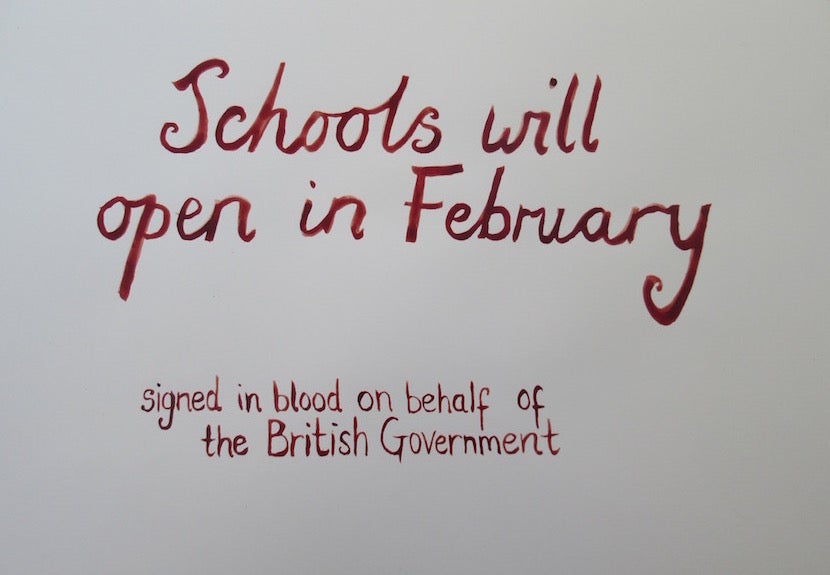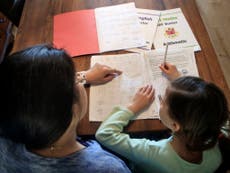I made art using menstrual blood to protest the effects of school closures
As a mother of three children, homeschooling has been difficult, verging on impossible. It’s vital schools reopen after February half-term


I am an artist and mother of three school-aged children. Following the call by the Chair of the Education Select Committee, Robert Halfon, for the reopening of schools after the February half-term to be “signed in blood and not just a guideline” – given there are likely to be “hundreds of thousands” of students who are not able to access remote learning – I felt moved to create a visual representation of that pledge, which I’ve called ‘Signed in Blood’.
As an artist, it was at once jarring and refreshing to hear such raw and powerful language amidst the despair, chaos and statistical overload of our usual daily news feed.
Why did I use menstrual blood? Because it’s a mother’s blood. It holds life within it and calls upon us to protect the wellbeing of children – and to recognise the importance of art and freedom for all. And at the moment, mothers are being sorely tested.
In my own experience, with three children all of very different levels and learning styles, home schooling is difficult, verging on impossible. It’s like being a teacher in three different classrooms; all at once.
One of my children, who’s five, needs constant action, drawing, making playdough and junk modelling. Meanwhile, my middle son, who’s eight, is dyslexic; so hasn't mastered the basics of literacy yet, making any independent home schooling impossible. He needs 'teaching', all the time.
Only my daughter, who’s 11, can sit down independently and do her work – but she’s fully immersed in going through puberty and is very quiet and a bit withdrawn. She desperately needs her peers to share all of her new developments with. All this, whilst supposedly working from home myself. My husband is a critical worker and isn’t available to help much at all. And I’m nowhere near alone in this experience.
In my eyes, the mention of “blood” only reinforces the importance for children to return to school. This is because it’s a physical need – children deserve the experience of human contact, which is far removed from the new digital norm of learning via a computer screen.
Has everyone forgotten about books? About just how much children learn from play? Society is asking too much of children when we isolate them from interaction and guided learning in this way.
While schools remain closed, many children are going through situations where they’re dealing with parents who can’t get out of bed because they suffer from severe depression; or are experiencing neglect. Some don’t have enough to eat, as we’ve seen with the free school lunches fiasco; others are living on sweets and crisps.
Even in loving and child-centred homes, it’s still vital that children go to school. School gives them the benefit of learning within their own age group, and the space and facilities to create the optimum environment for focus and learning.
It’s absolutely vital that schools reopen after the February half-term and that this period of isolation doesn’t stretch until Easter – or the summer.
If schools go back now, we as parents can pledge not to mix with anyone who risks becoming seriously unwell with Covid at this time; unless it’s unavoidable – such as in multi-generational households, for carers or the critically vulnerable.
But many of us could take our children to school without interacting with the elderly or vulnerable. With extra care, we could protect those most at risk from the virus – and also protect our children from physiological, psychological and educational deprivation.
In some ways, the first round of school closures was a novelty for children; and we had better weather, so there was an opportunity for lots of outdoor interaction.
Now, children are trapped at home and the strains of boredom are starting to show. I think responsible adults owe it to children to maintain their stability and a right to learn. We need – alongside the vaccine roll-out – a pledge to children from our government to deliver good face-to-face education; to prevent this ongoing struggle.
They have been out of school for long enough. To extend this experience beyond the February half term, in my opinion, would have consequences on our youngest minds that could ultimately pose far greater risks than Covid.
It is our duty to protect the educational and emotional wellbeing of our children. Nobody is a winner in this – but at least let us (the grown-ups) take the struggle, feel isolated, and continue to reduce the spread of the virus, whilst letting our kids learn, move forwards, stay happy and connected to one another.
This is becoming a desperate and unjust situation for children. It’s a human rights issue – and we must rally to their aid.

.jpg?quality=75&width=230&auto=webp)


Join our commenting forum
Join thought-provoking conversations, follow other Independent readers and see their replies